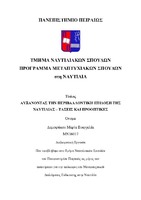Αυξάνοντας την περιβαλλοντική επίδοση της ναυτιλίας - τάσεις και προοπτικές
Increasing the environmental performance of the maritime industry - trends and perspectives

Master Thesis
Συγγραφέας
Δεμοιράκου, Μαρία - Ευαγγελία
Ημερομηνία
2018-11Επιβλέπων
Τσελέντης, ΒασίλειοςΠροβολή/
Λέξεις κλειδιά
Περιβάλλον ; Θαλάσσια έρματα ; Θαλάσσιοι ρύποι ; Eco-ports ; Eco-shipsΠερίληψη
Η μεταφορά, αποθήκευση και χρήση του LNG, δηλαδή του υγροποιημένου φυσικού αερίου, στα σύγχρονα πλοία, οι μέθοδοι επεξεργασίας και διαχείρισης του έρματος (Ballast), οι κανονισμοί αερίων ρύπων στη ναυτιλία και οι τρόποι περιορισμού τους αποτελούν τρόπους διαχείρισης των περιβαλλοντικών επιπτώσεων της ναυτιλίας και των τρόπων μείωσης του αποτυπώματος όλων των σχετικών λειτουργιών και διαδικασιών στο περιβάλλον. Ομοίως, τα σχέδια περιβαλλοντικής διαχείρισης και πιστοποίησης ποιότητας, τα λιμάνια ecoports, και τα zero emission ships αποτελούν τις τελευταίες περιβαλλοντικές πρακτικές που χρησιμοποιούνται για τη μείωση των επιπτώσεων στο γενικότερο περιβάλλον. Στις μέρες μας αποτελεί γεγονός πως όλο και περισσότερο, νέες μορφές ενέργειας, λιγότερο ρυπογόνες για το περιβάλλον, χρησιμοποιούνται με στόχο τον περιορισμό του φαινομένου του θερμοκηπίου και της συμβολής του στην καταστροφή του περιβάλλοντος. Για αυτό το λόγο, τα βλέμματα όλων των ειδικών του ναυτιλιακού χώρου, βρίσκονται στραμμένα στη χρήση του φυσικού αερίου ως καυσίμου στα πλοία. Η ραγδαία εξέλιξη της τεχνολογίας στις μέρες μας βοηθά ώστε να γίνει αυτό πραγματικότητα, μιας και το υγροποιημένο φυσικό αέριο θέλει ιδιαίτερη προσοχή στην μεταφορά του για να διατηρηθεί σε αυτήν την κατάσταση. Επίσης, έχουν δημιουργηθεί νέες υποδομές στα λιμάνια και σύγχρονα υγραεριοφόρα πλοία, τα οποία μπορούν να αντεπεξέλθουν στις απαιτούμενες συνθήκες. Τα σύγχρονα πλοία διαθέτουν μηχανές εσωτερικής καύσεως νέας τεχνολογίας, οι οποίες μπορούν να χρησιμοποιήσουν το καύσιμο αυτό ως μέσο πρόωσης. Αυτά, έχουν δυο είδη δεξαμενών αποθήκευσης, οι οποίες διατηρούν το φυσικό αέριο σε υγρή μορφή και σε θερμοκρασία -162⁰C ώστε να μεταφέρουν περισσότερο όγκο. Έτσι λοιπόν, τα βλέμματα όλων των ειδικών του ναυτιλιακού χώρου, βρίσκονται στραμμένα στη χρήση φυσικού αερίου ως καυσίμου στα πλοία. Παρόμοια σημασία δίνεται και στη διαχείριση του έρματος (Ballast) καθώς και στην υιοθέτηση όλο και περισσότερο αποτελεσματικών πρακτικών περιορισμού των περιβαλλοντικών επιπτώσεων.


